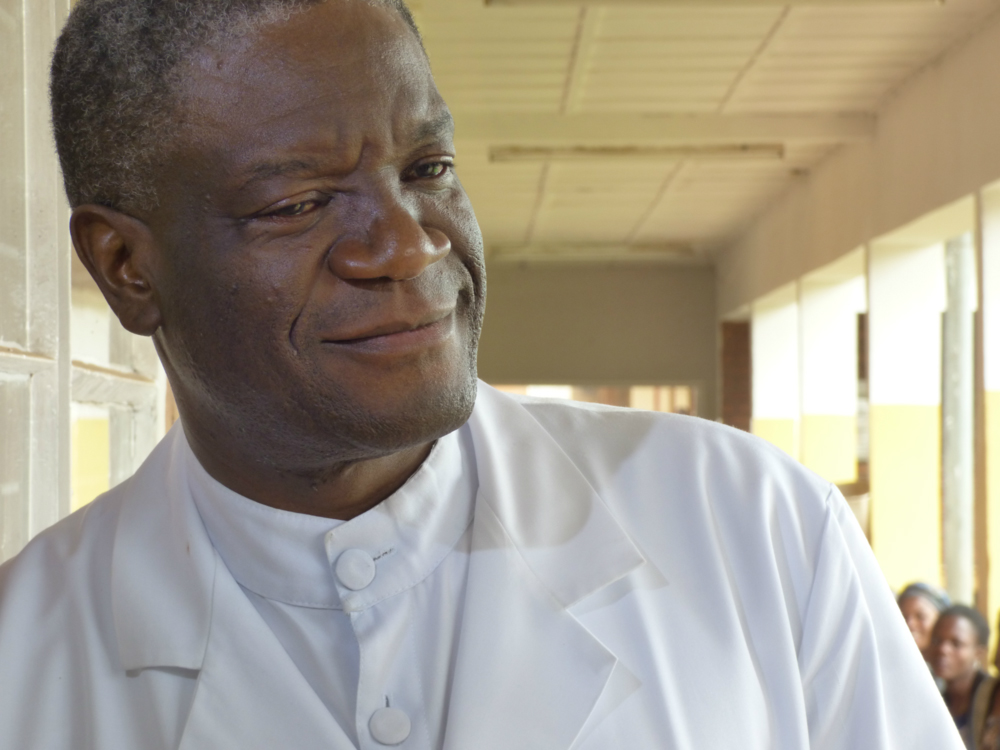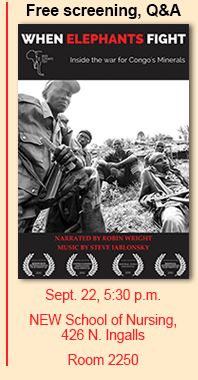Congolese surgeon and three-time Nobel Peace Prize nominee Denis Mukwege will join documentary film director Michael Ramsdell, a native of Flint, Mich., for a special screening of Ramsdell’s movie, When Elephants Fight. The 90-minute film explores the consequences of Democratic Republic of Congo’s ongoing civil war – fallout that Dr. Mukwege sees regularly at his hospital.

“This really helps put the political pieces together with the health and humanitarian pieces in order to see the full picture, which is a horrific story,” said U-M School of Nursing Associate Professor Janis Miller, PhD, RN, who helped organize the event. “Mike in his film has documented the crisis and the underlying reasons, while Dr. Mukwege has dealt with the resulting trauma of that. Hearing these two speak together is a rare opportunity.”
The Sept. 22 event at the School of Nursing is free and open to any students and faculty to attend. It will mark the first time that Mukwege and Ramsdell have appeared together. The screening and subsequent Q & A session will take place from 5:30 p.m. to 7:30 p.m. in the new School of Nursing building at 426 N. Ingalls.
An advocate for women’s rights
As Director of Panzi hospital in the city of Bukavu, Mukwege, MD, PhD, has treated more than 40,000 women victims of sexual violence and brutality, including many who’ve been victimized by soldiers in the country’s now decades-old civil war.
He’s dedicated most of his career to the cause, speaking out so often and so loudly that he’s drawn the ire of both the government and the region’s warring militia groups. An unsuccessful assassination attempt in 2012, following a speech to the United Nations, forced Mukwege into brief exile in Europe. But the Ob-Gyn doctor returned home a few months later and continues to advocate for the women of Congo.
Mukwege was named to Fortune Magazine’s 2016 list of the World’s 50 Greatest Leaders. This spring, he received a humanitarian award from the prominent Roosevelt Foundation.
“It is time to engage men and boys, with women and girls, in the struggle to end patriarchal discrimination and gender-based abuses,” Mukwege said in April upon receipt of the Roosevelt Freedom From Want award. “It is time to draw a red line against rape as a weapon of war, as a weapon of oppression.”
A nation torn by tech

A main factor driving the ongoing war in Congo is the mineral trade, as different rebel factions and complicit – and sometimes corrupt – government officials struggle for control over the region’s lucrative mining industry. Congo is a producer of cobalt, tungsten, tin and gold – all essential in the manufacture of cell phones and other modern electronic devices.
Ramsdell’s film spotlights the unintended consequences of modern consumer habits. He’s also an outspoken advocate for legislation mandating that US companies be more transparent about where their raw materials come from.
“Corporations are making billions from this. It’s unacceptable,” the director said in his 2012 TED Talk. “There are all kinds of actions out there to be taken to rewrite the story and reality of Congo.”
When Elephants Fight, Ramsdell’s third feature film, takes its name from a traditional African proverb: When two elephants are fighting, it’s the grass that suffers. Here’s a movie trailer.
‘You’ll come away inspired’
Dr. Miller, a Research Associate Professor in the Ob-Gyn department, travels at least twice a year to Congo, where she partners with Dr. Mukwege on various research projects.
She also helped launch the International Center for Advanced Research and Training, in Bukavu, which is focused on women’s issues as well. One aim of her current research is to geographically map the victims of sexual assault.
“We’re tracking patients who come through the hospital and seeing how those patients link back to the contested natural resource sites,” Dr. Miller said. “While difficult to get, that kind of information can help inform policy.”
While she’d traveled and worked extensively in many war-torn places over the years, she’d never thought of working in Congo until meeting Dr. Mukwege in 2010 during one of his two prior visits to Ann Arbor.
“I had zero interest in Africa until I spent one day with him. That’s all it took,” she said. “His whole message is very simple and clear: that even one person can make a difference. And he’s really good at bringing that spirit to others.
“You will come away inspired,” Dr. Miller said.
